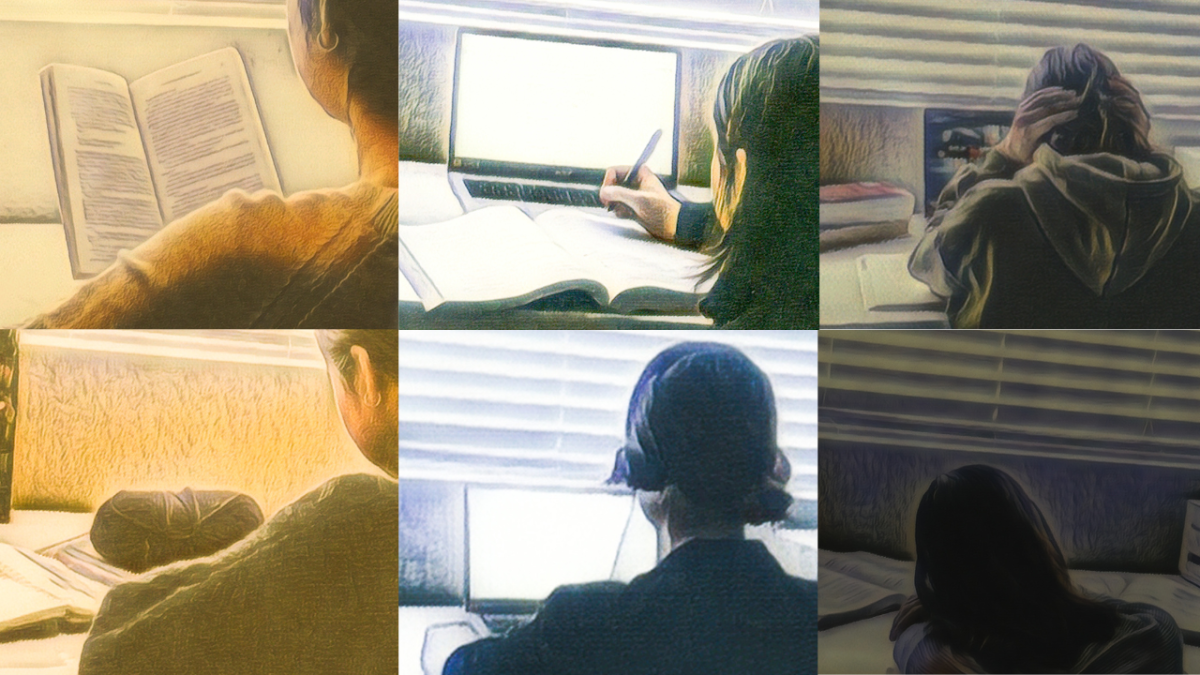Protecting Your Eyes During Virtual Learning

Eye strain from screen time can result in immense discomfort.
February 28, 2021
With Yorba Linda students operating on either a hybrid or fully-remote school schedule, hours of staring at a computer screen are inevitable. As issues such as slouching and fatigue are other results of long exposure to device screens, eye strain and damage are other serious consequences. Since school, other virtual events, and quarantine boredom result in this increased screen time, it’s imperative that students protect the health of their eyesight.
When we look at device screens for extended periods, certain damage, mostly minor and temporary, can occur in our eyes. The two most common occurrences from extensive screen time are eye fatigue and redness. When intense eye use is paired with the light of our devices, eye strain can occur. Focusing on the words or teachers on our screens for hours on end can result in headaches, double vision, and lack of concentration. And when focusing on our screens, blinking slows, resulting in dry and irritated eyes (susquehannahealth.org). Lauren Lanning (12) suffers from irritated eyes “after multiple hours spent on [her] computer.” In order to remedy these situations, students can make sure to take breaks from their screens as much as possible. While it is hard to find time away from our screens, any time that could be avoided is key to making sure our eyes are taken care of. And when dryness occurs, one can always rely on the use of eye drops.
When long periods of screen time build-up, some may experience more severe eye issues such as the occasional inability to focus their eyes on objects and nearsightedness. While the inability to focus usually wears off as we take time away from our screens, the formation of nearsightedness can have a lasting impact. The eyesight of children and teenagers is dependent upon exposure to natural light. With school online and multiple outdoor activities canceled, it’s difficult to receive the necessary amount of natural light needed to maintain the development of our eyes. Thus, individuals who are deprived of this natural light from virtual learning have an increased chance of developing nearsightedness in their future (susquehannahealth.org). However, one can avoid this issue by devoting time spent outdoors as much as quarantine allows.
The most severe impact of extended screen time is damage to our retina. Our light-sensitive cells located in the retina can be damaged by blue light, which is produced by our device screens. With severe retinal damage, one can experience a loss of eyesight later in their life (susquehannahealth.org). To avoid this issue, one must attempt to limit screen time as much as possible.
While immense screen time can damage our eye health, our sleep patterns can be negatively impacted too. When we spend much time on our screens before we go to sleep, the screen light can mimic daylight in our brains, causing our brains to believe that it’s daytime (susquehannahealth.org). Thus, the ability to fall asleep could become difficult. To avoid this difficulty, attempt to not use any devices at least an hour before you go to bed.
With the pandemic resulting in the dramatic increase in the time we spend in front of our computers, our health should remain our highest priority. And with the possibility of damaging our eyes growing with increased screen time, Mustangs must remember to take frequent breaks, lower our computer’s brightness, and spend as much time as we can in natural light.




































Fiona Salisbury • Mar 19, 2021 at 9:00 PM
I can really relate to this article. Especially towards the start of virtual school, my eyes were really bothered by the amount of time that I needed to spend on a computer. Even now, I feel like my sleep schedule has been negatively impacted by all of the screen time. Great article!
Emma Perron • Mar 7, 2021 at 6:30 PM
This is an important topic to talk about because we look at our computers and phones all day during school. Thank you for giving me such good information about this topic and ways to help. Great article.
KAYDEN MANDLEY • Mar 7, 2021 at 11:08 AM
Very informative article, Paige, you are such a great writer. Sometimes, if I’m on the computer for a long period of time, I find myself really tired and my eyes are super strained.
Nikole Galea • Mar 7, 2021 at 10:44 AM
Very good article Paige! I know how painful staring at a screen for hours on end can be so I invested in a good pair of blue light glasses. I think this article will provide others with the tips in order to protect there eyesight.
Katelyn Ruggles • Mar 6, 2021 at 4:32 PM
I have always had bad eyes, but I can definitely feel them getting worse as distance learning has been going on for a while and I’ve been constantly having to get new prescriptions for my eyes.
faith desio • Mar 4, 2021 at 6:26 PM
Thank you for this great article Paige! I purchased two pairs of blue light blocking glasses at the start of the school year. I think that they have helped with my headaches while having to stare at a screen for hours.
Sharon Sun • Mar 1, 2021 at 6:53 PM
Great article Paige! As a distance learner, I’ve definitely felt that eye strain from having so many hours of class on my laptop. To remedy this, I usually take a walk outside with music on my breaks.
Emily Eslao • Feb 28, 2021 at 11:39 PM
Thanks for giving us these tips, Paige- I definitely agree that my eyesight has gotten significantly worse during quarantine, particularly with screentime and becoming used to nearsightedness. Hopefully these habits can be broken, and this article is a great help!
Kylie de Best • Feb 28, 2021 at 6:47 PM
I have been using blue light glasses some days to help prevent my eyes from getting damaged. This is definitely an article that many can relate to.
Suhani Bhanvadia • Feb 28, 2021 at 6:21 PM
I have definitely found that my vision has gotten worse while having school online all day. Personally, I have found that using blue light glasses and just taking frequent breaks helps.